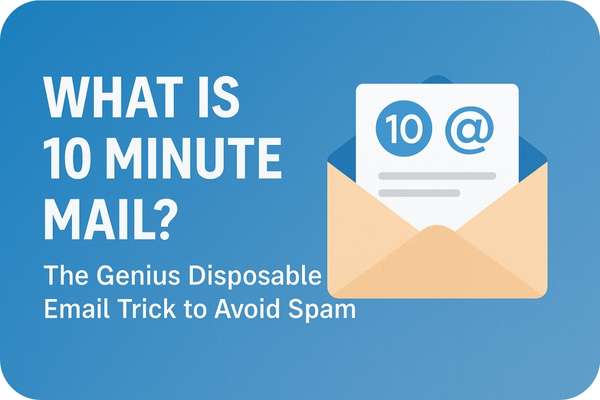This FREE Temp Mailbox Trick Will Blow Your Mind (Stop Using Your Real Email!)

Looking for the best way to protect your inbox from spam and keep your personal email private? This viral guide to free temp mailbox services reveals the smartest trick used by savvy users across the US, UK, Canada, and Australia. Whether you’re signing up for free trials, accessing gated content, or testing websites, a temporary email address can save you from email overload. In this detailed blog post, we break down the top tools like Temp-Mail, 10 Minute Mail, and Guerrilla Mail that Tier 1 users trust daily.
Learn how to stay anonymous online, avoid digital junk mail, and get instant email verifications—no login, no hassle. If you’re tired of junk mail and want a cleaner, safer web experience, this post is your golden ticket.
In today’s digital age, your inbox is your most valuable asset—and sometimes your biggest headache. Whether it’s endless spam, privacy concerns, or the risk of identity theft, your email address is constantly under siege. That’s where a free temp mailbox comes in. It’s like having a digital burner phone—use it and lose it. In this comprehensive guide, we’re diving deep into what a temporary email is, why you need one, and which services are the best. Ready to clean up your inbox and protect your privacy? Let’s jump in.
What Is a Free Temp Mailbox?
Definition and Purpose
A temp mailbox, short for “temporary mailbox,” is a disposable email address that’s created for short-term use. These email addresses usually expire after a certain amount of time—sometimes 10 minutes, sometimes an hour, and in other cases, when you close your browser. The primary goal? Simple: give users a way to sign up for websites, verify accounts, or receive one-time emails without using their real email address.
Imagine this: you want to access a free eBook, but the site requires you to register with your email. Enter your main inbox, and you’re bombarded with newsletters and sales pitches for weeks. Instead, you could use a temp email, grab the download link, and vanish without a trace. That’s the kind of power we’re talking about.
In essence, a temp mailbox works just like a regular email address, but it’s designed for quick, disposable use. You won’t be sending heartfelt letters or conducting business from one—but for those quick online interactions, it’s perfect.
Key Differences from Regular Email
Let’s make something clear: temporary emails are not here to replace Gmail, Outlook, or Yahoo Mail. Here are the primary differences that set temp mail apart:
-
Lifespan: Most temporary emails self-destruct after a short period.
-
No Sign-Up Needed: Unlike regular emails, no registration is necessary.
-
No Passwords or Recovery: These are not secure accounts; you don’t get a recovery option.
-
Limited Features: They generally allow receiving emails only (no sending).
-
Privacy First: Your identity isn’t tied to the account.
If you’re using temp mail for secure, long-term communication—stop. That’s not what it’s for. But if you need a quick way to dodge spam and keep your personal inbox squeaky clean, you’re in the right place.
Why Use a Temp Mailbox?
Online Privacy Protection
Let’s be honest: most websites don’t need your personal email. They want it for marketing. That’s where temp mail swoops in like a digital superhero. It allows you to keep your real email private, reducing the chances of being tracked, profiled, or added to shady mailing lists.
Whenever you’re unsure of a site’s credibility, using a temporary email is a solid first defense. You’re putting up a firewall between you and potential data misuse. No strings attached, no personal info shared. In an age where privacy is the new luxury, a temp email is your low-cost (free, actually) ticket to safety.
Avoiding Spam and Junk Mail
Everyone’s been there—you sign up for one little thing, and suddenly you’re flooded with “exclusive offers,” “once-in-a-lifetime deals,” and newsletters you never asked for. Sound familiar?
Using a free temp mailbox means you won’t be cleaning out your inbox for the next three weeks. It’s like wearing gloves before touching a greasy doorknob. Why risk contaminating your main inbox when you can use a throwaway one instead?
This is especially helpful for:
-
Signing up for free trials
-
Downloading content
-
Registering on forums or blogs
-
Accessing gated information
Spam can lower your productivity, increase stress, and even open doors to phishing attacks. Temp mail solves that problem instantly.
One-Time Verification Uses
Need to verify an account just once? Maybe you’re downloading an app or entering a giveaway. These are situations where temporary emails shine.
Verification emails often only need to be accessed once. There’s no long-term conversation involved—just a simple “click to confirm” process. With a temp mailbox, you complete the task and move on. No residual emails. No lingering connections. Just quick, clean interaction.
Many online services, including social media platforms and free software websites, require email verification to access content. Using your actual email can clutter your inbox or worse—subscribe you to something you never wanted. A temp mailbox is the hassle-free answer.
Read More:-
- This Free Temp Mail Tool Is Saving Users from Spam – Find Out How!
- This Genius Temporary Email Trick Will Keep Your Inbox 100% Spam-Free – Try It Now!
Benefits of Using Free Temporary Email Services
No Registration Required
Let’s face it—signing up for a new email account is a hassle. You have to enter your name, phone number, and even solve a CAPTCHA or two. With temp mail? None of that.
You land on the temp mail website and boom—you’re given an inbox. Just like that. No names, no passwords, no verifications. It’s the epitome of plug-and-play. Whether you’re in a rush or just can’t be bothered with another sign-up process, temp mail is your shortcut to instant access.
This ease-of-use factor makes temp mail ideal for:
-
Developers testing apps
-
Shoppers hunting for coupon codes
-
Users accessing short-term services
It’s fast. It’s anonymous. And it’s free.
Fast and Anonymous Access
Need access now? You got it. Temp mail gives you a working email address within seconds, and you’re good to go.
Because there’s no sign-up, there’s also no identity attached. This makes temp mail ideal for protecting your privacy, especially when exploring unknown or untrusted websites. You don’t need to worry about leaving a digital trail. Use it, get your confirmation, and walk away like a ninja.
Disposable and Secure
One of the biggest advantages of temp mail? It’s designed to disappear. Most services automatically delete your email address and any incoming messages after a set time—ranging from 10 minutes to a few hours.
This self-destructing nature adds an extra layer of security. There’s no archive. No lingering data. No way for hackers to retrieve old messages. It’s a clean slate every time.
Think of it as the Mission Impossible of email services—“This inbox will self-destruct in 10 minutes.”
Popular Free Temp Mailbox Providers
Temp-Mail
Temp-Mail is arguably one of the most popular temporary email services on the internet, and for good reason. It’s lightning fast, incredibly simple to use, and offers robust features for something that’s 100% free. As soon as you visit the site, you’re assigned a random email address, and you can immediately start receiving messages.
Key features:
-
Automatically generates a random email
-
Supports multiple domain options
-
Inbox refreshes in real time
-
Chrome extension and mobile apps available
Temp-Mail also offers premium features for users who want a bit more control, such as custom email names or extended email storage. But even at the free tier, it’s a solid choice for anyone needing a quick, disposable address.
This service is perfect for:
-
Signing up on websites you’ll use once
-
Receiving verification codes instantly
-
Downloading resources without sharing your real email
Whether you’re a developer testing sign-up flows or a consumer dodging spam, Temp-Mail makes your digital life much easier.
Guerrilla Mail
Guerrilla Mail has been in the game since 2006 and remains one of the most trusted names in the temporary email space. Unlike some services that delete your mailbox after a short period, Guerrilla Mail allows you to keep the email active as long as your session remains open.
Highlights:
-
Offers both inbox and sending capabilities
-
Ability to choose your own email username
-
Email address remains available until browser session ends
-
Anti-spam and filter protections built-in
Guerrilla Mail is more customizable than most temp mail providers. You can choose from several domains, set your preferred email prefix, and even send replies. This makes it one of the few temp mail options that supports two-way communication.
For users who need more control and slight longevity, Guerrilla Mail is an excellent option.
10 Minute Mail
As the name suggests, 10 Minute Mail gives you a fully functional inbox for ten minutes. Once the time expires, the email and its contents are deleted. The beauty of this service lies in its simplicity. It’s fast, lightweight, and does exactly what it promises—nothing more, nothing less.
Features include:
-
10-minute timer (extendable if needed)
-
Quick setup, no sign-up required
-
Email self-destructs automatically
-
Real-time inbox updates
10 Minute Mail is perfect when you need ultra-quick email verification. You get in, get out, and leave no digital breadcrumbs. The ability to extend the email lifespan is also a great touch, especially if your verification code takes a bit longer to arrive.
For sheer speed and minimalism, this service is hard to beat.
Maildrop
Maildrop is a little different. It’s not just about privacy and speed—it also focuses heavily on spam filtering. Maildrop provides public inboxes that anyone can access, but it uses strong filters to keep unwanted content at bay.
What stands out:
-
No sign-up needed
-
Clean, spam-free inbox
-
Allows multiple users to access the same inbox
-
Good for public and anonymous use
Maildrop is ideal for users who frequently test websites or apps and need to see multiple incoming messages over time. Keep in mind, however, that because inboxes are public, anyone who knows your email alias can view your messages.
So while it’s not the best for secure information, it’s a great tool for testing and one-off registrations.
ThrowAwayMail
ThrowAwayMail is another solid contender in the temporary email space. It provides users with a unique email address valid for 48 hours—much longer than most of its competitors. The interface is clean and straightforward, making it easy for even non-tech-savvy users to take advantage.
Key benefits:
-
48-hour validity
-
No registration
-
Simple and clean user interface
-
Automatically generated inbox
ThrowAwayMail is best used for sign-ups that may take more than just a few minutes to verify. If you’re waiting on a delayed confirmation email or want a bit more flexibility without going full permanent, this service strikes a nice balance.
It’s the “weekend getaway” of temp emails—temporary, but just long enough to enjoy the ride.
How to Use a Temp Mailbox Effectively
Creating an Email in Seconds
The beauty of temp mail lies in its simplicity. Here’s how to get started in most cases:
-
Visit the Website: Choose a service like Temp-Mail, Guerrilla Mail, or 10 Minute Mail.
-
Copy the Email Address: The site will instantly generate a random address.
-
Paste Where Needed: Use this email to sign up, download, or verify.
-
Check Inbox: The webpage usually shows incoming messages in real time.
-
Done: Once finished, walk away. The email will self-destruct or expire.
This entire process takes less than 30 seconds, making temp mail perfect for busy users or on-the-go scenarios.
Most platforms even support mobile use, so whether you’re on your phone or desktop, you’re just a few clicks away from securing your inbox.
Best Practices for Temporary Email Usage
To get the most out of your temporary email experience while keeping things secure, here are some tips:
-
Never Use for Banking or Sensitive Data: Temp mail is not secure enough for financial transactions.
-
Don’t Use for Long-Term Communication: These accounts are meant to vanish.
-
Be Aware of Public Inboxes: If a service offers public access, avoid using it for anything personal.
-
Refresh the Page: Sometimes emails can take a few seconds to arrive. Refresh if needed.
-
Use for One-Time Needs Only: Think of it as a single-use item—great for short tasks, not for storage.
By following these best practices, you can keep your digital identity protected while enjoying the convenience of temp mail.
Managing and Deleting Temporary Emails
You might wonder—what happens to your messages? Most services will auto-delete your emails after a set period. But if you’re using a temp mail with a longer duration (like ThrowAwayMail or Guerrilla Mail), here’s how to manage things effectively:
-
Close Your Browser: For many services, simply closing the session deletes everything.
-
Use the Delete Button: Some platforms have manual delete options for extra control.
-
Rely on Timers: Services like 10 Minute Mail do the cleanup for you.
-
Avoid Logging Personal Data: Never input real names, phone numbers, or passwords in temp mail unless you’re okay with them being lost.
With temp mail, management is refreshingly minimal. The goal isn’t to organize—it’s to avoid ever needing to.
Security Concerns and Limitations of Temp Mail
Are Temporary Emails Truly Safe?
Let’s get this out of the way—temporary emails are relatively safe for low-risk activities, but they’re not a bulletproof solution. They’re designed for anonymity and convenience, not for top-level security.
Here’s the reality:
-
Temp mail services don’t require passwords, which means anyone with access to your temp address URL can read the emails.
-
Many inboxes are public or easily guessable, especially those without username customization.
-
Emails are often unencrypted, which leaves them vulnerable to interception or monitoring.
That said, if you’re simply trying to avoid spam or want to receive a quick verification code, the risk is minimal. But if you’re dealing with sensitive data—think financial info, passwords, or legal documents—temp mail is a no-go.
The best practice? Use temp mail only for basic, low-security tasks and always assume that what goes into that inbox could be seen by someone else.
No Password Protection
One major downside to most temporary email services is the lack of password protection. You don’t log in. There’s no secure connection to your identity. It’s just an open box.
So while this is great for convenience, it’s terrible for privacy if you share or lose your unique email address. Someone else could access the same inbox and read your messages.
This makes it unsuitable for:
-
Work communications
-
Subscription management
-
Anything with sensitive data
Again, it’s all about how you use it. For casual interactions? Perfect. For anything else? Stick with Gmail or ProtonMail.
Data Retention and Tracking
Despite their privacy pitch, not all temp mail services are angels. Some may collect data for analytics, track your IP address, or log usage patterns. After all, someone’s footing the bill for that free service.
Make sure you choose a reputable service with a clear privacy policy. Look for statements that promise:
-
No IP tracking
-
No data logging
-
End-to-end encryption (if possible)
Tools like Temp-Mail and Guerrilla Mail are more transparent than others, but it’s still on you to do the homework. If you’re truly concerned about digital privacy, pairing temp mail with a VPN is a smart move.
Best Use Cases for Temporary Email Services
Sign-Ups and Free Trials
One of the biggest benefits of temp mail is effortlessly sidestepping annoying sign-ups. Whether you’re trying a new tool, downloading a freebie, or grabbing a discount code, most sites demand an email before giving you anything.
Instead of surrendering your main inbox to the gods of spam, just grab a temp address, sign up, and move on.
You can use temporary emails to:
-
Register for software trials
-
Access free downloads (like eBooks or PDFs)
-
Sign up for webinars or newsletters (just for the free content)
It’s like giving your real inbox a vacation.
Testing and Development
If you’re a developer, QA tester, or marketer, temporary emails are an absolute game-changer. You can generate dozens of unique addresses for testing registration forms, user workflows, email automation, and more—without polluting your actual email accounts.
Some common testing scenarios include:
-
Verifying confirmation email logic
-
Testing forgotten password flows
-
Ensuring email design and formatting are correct
-
Load testing platforms with multiple users
When you’re doing sandbox testing or staging server trials, temp mail saves time, keeps things clean, and gets the job done.
Anonymous Feedback or Reporting
In certain scenarios, like whistleblowing, giving anonymous feedback, or reporting sensitive issues, temp emails offer a veil of protection. You can send messages, receive confirmations, and even conduct short-term conversations without linking your personal identity.
Services like Guerrilla Mail allow sending emails, which is rare for temp services. This enables basic two-way communication, adding an extra layer of utility.
Just remember—use this power ethically.
Temp Mail vs. Permanent Disposable Email Services
Differences in Functionality
It’s easy to lump temporary and disposable emails into the same basket, but they’re not identical. Temporary emails are like fast food—cheap, quick, and gone in minutes. Permanent disposable emails are more like meal prep—they stick around longer, require a bit more setup, but give you more control.
Here’s a quick comparison:
| Feature | Temp Email | Disposable (Permanent) Email |
|---|---|---|
| Lifespan | Minutes to hours | Weeks, months, or indefinite |
| Password Protection | Rarely | Often included |
| Custom Domain or Alias | Limited | Available |
| Suitable for Long-Term Use? | No | Yes |
| Privacy Level | Basic | Moderate to High |
Permanent disposable emails (like those from SimpleLogin or AnonAddy) give you a permanent alias that forwards to your real inbox. You can disable it anytime—ideal if you want to control who has access to your inbox without going full temporary.
Use Case Breakdown
Use a temp email when:
-
You need it just once
-
You want zero commitment
-
You’re dealing with untrusted sources
Use a disposable (permanent) email when:
-
You need to manage multiple aliases
-
You want forwarding to your main inbox
-
You require password protection
Both tools have their place—use wisely.
Future of Temporary Email Services
Growing Demand for Privacy
As digital privacy concerns grow, so does the demand for anonymous tools. Temp mail services are seeing massive increases in usage, especially as more users look for ways to avoid data harvesting and unsolicited marketing.
Privacy is no longer a niche concern—it’s mainstream. And temporary emails are a quick fix for users wanting control without committing to complex setups.
Expect to see:
-
Better mobile apps
-
More secure temp mail services
-
Wider integration with browsers and extensions
Advanced Features on the Horizon
While current temp mail services are largely simple, future offerings may include:
-
Email encryption
-
Multi-session access
-
Reply functionality
-
Integration with secure browsing tools (VPNs, Tor)
This space is evolving, and soon, temporary email might be as sophisticated as regular email—just with a self-destruct timer.
Challenges and Potential Bans
Of course, not everyone loves temp mail. Many websites actively block them to prevent abuse, fake sign-ups, or fraud. Captchas, email domain filters, and blacklists are increasingly common.
Some countries may even consider regulation, especially where temp emails are used for cybercrime or evasion of digital identity systems.
Still, for the vast majority of users who want a clean, spam-free online experience, temp mail will remain a useful, if sometimes blocked, tool.
Conclusion
Temporary email addresses aren’t just a cool trick—they’re a powerful tool for protecting your privacy, managing digital clutter, and navigating the web smarter. Whether you’re sidestepping spam, testing your app, or just downloading a whitepaper, temp mail helps you do it without sacrificing your personal data.
It’s the digital version of a burner phone—quick, anonymous, and disposable.
But like any tool, it has its limits. Use it wisely. Don’t trust it with your deepest secrets. And always remember that while temp mail helps you stay under the radar, it’s no replacement for real, secure email solutions when things get serious.
So next time you’re faced with a sketchy sign-up page, don’t flinch—just use a temp mailbox and move on with your life. Clean, easy, and stress-free.
FAQs
1. Can I send emails using a temp mailbox?
Some temp mail services like Guerrilla Mail allow sending, but most only support receiving. They’re meant for short-term use, not communication.
2. How long do temporary emails last?
It varies. 10 Minute Mail lasts—unsurprisingly—for 10 minutes. Others like ThrowAwayMail may last up to 48 hours.
3. Is it illegal to use a temporary email?
No, using temp email services is legal. However, using them for fraudulent or malicious purposes can be illegal.
4. Can websites detect temp mail addresses?
Yes, many websites block known temp mail domains. You may need to try a different provider or domain.
5. What should I avoid using temp email for?
Avoid using it for anything sensitive—banking, legal communications, or services where long-term access is important.





